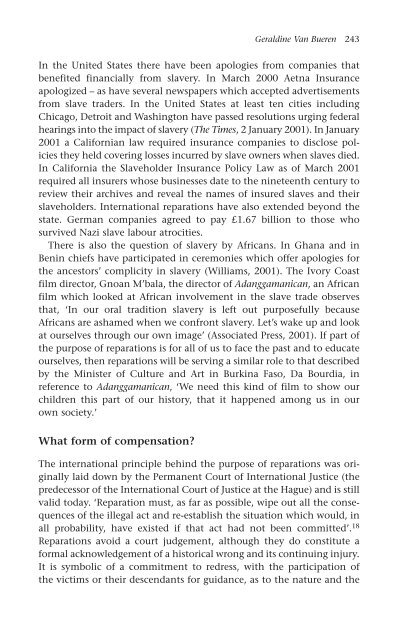3071-The political economy of new slavery
3071-The political economy of new slavery
3071-The political economy of new slavery
Create successful ePaper yourself
Turn your PDF publications into a flip-book with our unique Google optimized e-Paper software.
Geraldine Van Bueren 243<br />
In the United States there have been apologies from companies that<br />
benefited financially from <strong>slavery</strong>. In March 2000 Aetna Insurance<br />
apologized – as have several <strong>new</strong>spapers which accepted advertisements<br />
from slave traders. In the United States at least ten cities including<br />
Chicago, Detroit and Washington have passed resolutions urging federal<br />
hearings into the impact <strong>of</strong> <strong>slavery</strong> (<strong>The</strong> Times, 2 January 2001). In January<br />
2001 a Californian law required insurance companies to disclose policies<br />
they held covering losses incurred by slave owners when slaves died.<br />
In California the Slaveholder Insurance Policy Law as <strong>of</strong> March 2001<br />
required all insurers whose businesses date to the nineteenth century to<br />
review their archives and reveal the names <strong>of</strong> insured slaves and their<br />
slaveholders. International reparations have also extended beyond the<br />
state. German companies agreed to pay £1.67 billion to those who<br />
survived Nazi slave labour atrocities.<br />
<strong>The</strong>re is also the question <strong>of</strong> <strong>slavery</strong> by Africans. In Ghana and in<br />
Benin chiefs have participated in ceremonies which <strong>of</strong>fer apologies for<br />
the ancestors’ complicity in <strong>slavery</strong> (Williams, 2001). <strong>The</strong> Ivory Coast<br />
film director, Gnoan M’bala, the director <strong>of</strong> Adanggamanican, an African<br />
film which looked at African involvement in the slave trade observes<br />
that, ‘In our oral tradition <strong>slavery</strong> is left out purposefully because<br />
Africans are ashamed when we confront <strong>slavery</strong>. Let’s wake up and look<br />
at ourselves through our own image’ (Associated Press, 2001). If part <strong>of</strong><br />
the purpose <strong>of</strong> reparations is for all <strong>of</strong> us to face the past and to educate<br />
ourselves, then reparations will be serving a similar role to that described<br />
by the Minister <strong>of</strong> Culture and Art in Burkina Faso, Da Bourdia, in<br />
reference to Adanggamanican, ‘We need this kind <strong>of</strong> film to show our<br />
children this part <strong>of</strong> our history, that it happened among us in our<br />
own society.’<br />
What form <strong>of</strong> compensation?<br />
<strong>The</strong> international principle behind the purpose <strong>of</strong> reparations was originally<br />
laid down by the Permanent Court <strong>of</strong> International Justice (the<br />
predecessor <strong>of</strong> the International Court <strong>of</strong> Justice at the Hague) and is still<br />
valid today. ‘Reparation must, as far as possible, wipe out all the consequences<br />
<strong>of</strong> the illegal act and re-establish the situation which would, in<br />
all probability, have existed if that act had not been committed’. 18<br />
Reparations avoid a court judgement, although they do constitute a<br />
formal acknowledgement <strong>of</strong> a historical wrong and its continuing injury.<br />
It is symbolic <strong>of</strong> a commitment to redress, with the participation <strong>of</strong><br />
the victims or their descendants for guidance, as to the nature and the


